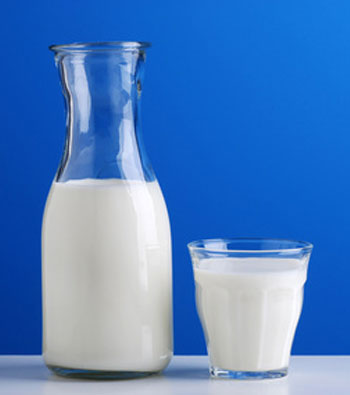

Lactose intolerance refers to the inability to digest lactose, the sugar found in dairy and other milk products. The condition is caused by a deficiency of lactase, the enzyme that enables the body to break down the compound. It affects adults, but in rare cases it can also affect infants preventing them from drinking human milk without side effects. Injury to the small intestine or genetic factors can also cause lactase deficiency resulting in intolerance.
The symptoms and effects of lactose intolerance are rarely harmful, though they can cause pain or distress, especially if multiple symptoms occur together. Common symptoms include bloating, stomach and intestinal cramps, excessive rumbling in the stomach, flatulence, diarrhoea, nausea, vomiting, etc. Patients suffering from another gastrointestinal disease akin to Irritable Bowel Syndrome or Crohn's Disease often experience elevated levels of discomfort after consuming milk or dairy products, but it is not always due to lactose intolerance and could be attributed to milk protein intolerance or other factors.
In mammals, lactase production decreases after weaning and stops completely as they approach maturity, making them lactose intolerant. However, in humans, lactase persistence, where the body continues to produce lactase into adulthood is common, though recent research has shown that the condition is more widespread than lactase persistence, with a sharp decline in lactase production during teenage years, and consequently most adults suffer from problems with the compound. It is estimated that around 60-70 percent of Indians are lactose intolerant, though certain studies done in northern India point to lower figures in the range of 40-50 percent.
There is no cure for lactose intolerance and it isn't really a disease, and the symptoms are easily countered by avoiding milk and dairy products that contain the sugar. However, milk contains several essential nutrients that need to be replenished with alternatives such as soy milk. Since the symptoms are similar to milk protein and fructose intolerance, it is vital to determine the nature and cause of the symptoms for efficacious treatment. While the ImuPro test cannot detect lactose intolerance (it checks for reaction to food groups and not enzyme production – the condition is not an immune response), it can enable an individual to rule out other intolerances and potential harmful foods. If such a trigger food is detected, the results will also include suitable alternatives for maintaining a balanced diet. We offer three examinations, ImuPro100 that checks for 90 items, ImuPro200 that analyses 180 products and ImuPro300, the most comprehensive exam that verifies reactions to 270 items. We also provide a personalised diet plan and recipe book that provides the list of recommended products and substitutes for items causing the allergic reactions.
Contact Information
› More ImuPro Products